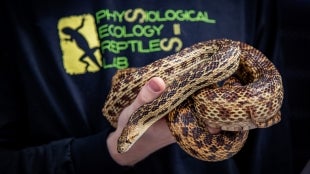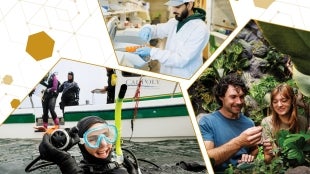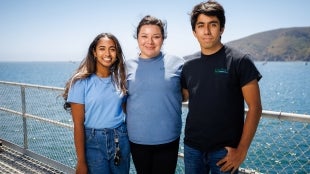Inspiring a Brighter Future: BCSM Innovation and Entrepreneurship Initiative Launches
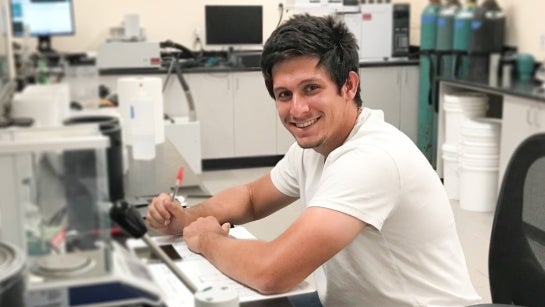
While trying to learn chemistry online in the heart of pandemic social distancing in 2020-2021, Cal Poly chemistry graduate student Adam Langevin recognized the need for a well-designed virtual lab offering students effective remote learning.
That concept is now the focus of his startup business, V-Lab Education, designed to serve K-12 schools and homeschool programs that may not have access to laboratory glassware or chemicals.
Langevin’s project is an example of the type of idea that a new College of Science and Mathematics (CSM) Innovation Initiative is encouraging — and he’s receiving program mentorship to further his business goals.
“If you have an idea that doesn’t exist in the market, or you think you can do it better than what's currently offered, we have mechanisms for enabling you to explore that,” said chemistry Professor Erik Sapper, CSM Innovation Initiative program faculty coordinator. “We’re here to offer that support at any stage of development.”
Langevin’s V-Lab model allows students virtually to handle flasks in a simulated lab environment, using video-game-like Bunsen burners and crucible tongs to study chemical reactions. He’s partnering with computer science students to offer course packages for purchase on an app.
“Science is so much more than memorizing molecules from a whiteboard,” said Langevin, of Newport Beach. “It’s about putting on a coat, goggles and gloves and stepping into a lab and really exploring how things work. I wanted others to learn through virtual lab experimentation in ways they otherwise might not have the opportunity to do.”
In its first year of existence, the CSM Innovation Initiative offers students a variety of resources and networking opportunities to advance entrepreneurial inspirations, partnering with Cal Poly’s Center for Innovation & Entrepreneurship (CIE).
The CIE’s Hatchery and HotHouse connect students from different majors to help craft successful business plans, pursue funding opportunities and usher ventures to market. The Elevator Pitch Competition allows students to present business models to angel investors.
Student participants read books on business process models, pair with coaches and shape ideas from potential patent-pending products to consulting companies.
Langevin said he has received business mentorship from Jose Huitron, CIE’s director of student innovation programs, and participated in an investor pitch competition.
“I’ve had multiple meetings with mentors about things like intellectual property and market strategy, along with other aspects of business that I wasn’t too familiar with,” said Langevin.
Current CSM-related innovation projects underway include a team creating biodegradable plastics and another designing self-healing concrete made with polymer microcapsules that release new concrete to fill cracks.
“I really enjoy creating things that are tangible, real-world projects,” said Bailey Morales, who’s partnering with classmate Kyle Hoff and recent biological sciences graduate Matlynn Giles on the self-healing concrete model. “We’re hoping this will be patented one day.”
The CSM Innovation Initiative launched in Summer 2022 after a generous donation from Tim Giestlinger (Biochemistry, ’92) and his wife, Janelle.
Giestlinger, an entrepreneur and founding scientist behind Beyond Meat, is now a chief technology officer of Perfect Day, a disruptive dairy startup developing technology to produce milk from fermentation, not cows.
“The Giestlingers’ support further expands opportunities and resources for CSM students to pursue their creative ideas,” said Dean Wendt, CSM’s dean. “This is such a joy to watch take shape. I’m enthusiastic about this program and the possibilities that it can bring.”
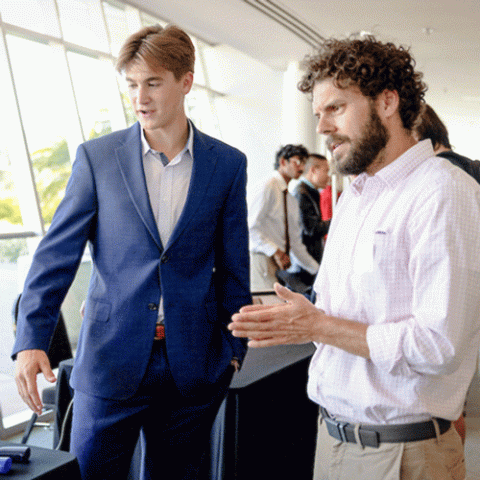
Since its inception, CSM students have attended the CIE Summer Accelerator’s guest speaker series at their downtown HotHouse and the Innovation Sandbox, an on-campus lab for developing ideas and prototyping.
Sapper plans to line up a series of Cal Poly alumni speakers successful in innovation and entrepreneurship to share insights — and to establish a new innovation challenge.
“The goal of this innovation challenge would be to get science and math majors together, over a weekend or a couple of weekdays, to take part in a design thinking event, almost like hyperactive brainstorming,” Sapper said.
Sapper said the competition could inspire them to pursue their ventures and join the Cal Poly Entrepreneurs Club or participate in the Elevator Pitch Competition.
“If a student has an idea for a company, in one year they could be in a summer accelerator team, talking to venture capitalists and learning about how to acquire funding and develop a market strategy,” Sapper said.
Sapper said he believes high demand exists for science and math majors to be part of CIE student teams as science methodology by nature is problem-solving and applicable to business challenges.
“People are desperate for students in our majors to become involved and to cooperate and collaborate with them because they can appreciate ‘Wow, here’s somebody who loves to do math at the college level or physics for fun,’” Sapper said. “There’s huge demand for an analytical problem-solving mind in the startup world. And for our students, it’s a chance to discover a career pathway outside of academia and to become involved in industry.”


